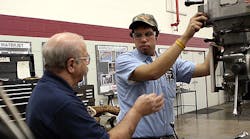When I attend a gathering of industry officials, I don’t talk too much. This is in part my nature, and partly a strategy. I have lots of opinions, but early in life I realized I’d learn more by listening than by talking, and working as a reporter/editor/commentator in a subject about which I have no technical or practical expertise has only reinforced that lesson. But, a few weeks back I was at a gathering of metalcasting industry leaders and a subject came up that provoked me.
Chatting with two well-informed men the conversation covered the usual subjects of common and general interest. China, of course: the development of metalcasting there, the state of its economy and the society, and the future development of all these. You’ve probably been part of a similar discussion, too. It seems always to lead to someone making a dire prediction about our own prospects.
That’s what happened to me. “In 10 years or so,” opined one of these men, “the United States will be like Great Britain.” He wasn’t being complimentary: he meant that the general public is greedy and shortsighted. They no longer share the pride that goes with a strong, diverse national economy: they want “entitlements” and aren’t concerned that virtually every consumer product may be imported from some low-cost offshore supplier. He worried about the availability of domestic resources, questioned the opportunities for U.S. manufacturers, and doubted the resilience of the economy for combating foreign competition.
I wasn’t surprised by the observation. I’ve noted the variety of products available at the big discount chain stores, and how very few of them are manufactured domestically. I’ve kept track of the manufacturing sector for the past decade or so and know the trend lines. I’ve watch as the scourge of “legacy costs” moved through the basic industries (metals, mining), and how it’s now tearing into the big manufacturing segment (autos, aerospace.)
What surprised me was the certainty of this well-informed man. Like Great Britain? Not a chance. We may be shortsighted and self-serving people, but this is not an economy or society that will accept central planning. We compete with each other as much as we do with When California set about regulated industries, industries moved to other states. When Alabama and many other states recruited automakers and their suppliers, they created a tide of foreign investment and regional expansions. I believe the same competitive impulse will continue to find outlets, leading to eventually to wiser tax and regulatory policies, more qualified workforces, and better access to investment capital.
I pointed this out and got some general agreement, but it later occurred to me that there’s something more important than being unlike Great Britain. We’re unlike China in some critical ways, too. We’re not expanding our prosperity by undermining anyone else’s. The more prosperity there is, the better for everyone.
I recalled all this when I read the results of a survey conducted earlier this spring by the National Association of Manufacturers. Across all sectors, 53% of respondents see 2005 economic growth in the range of 2 to 3%; 28% see it running even higher than that. More encouraging, 66% of all respondents see manufacturing expanding at a rate equal to or better than the overall economy. More than half (53%) have plans to increase capital spending this year, mostly (64%) to modernize their equipment or increase efficiency.
It’s nice to read numbers like that, and encouraging to have facts to back up my opinions. But, I think a better observation is that none of us has all the answers. One man’s grim outlook is not indicated in the broader survey. No one’s opinion is the last word. The strength of our way of living and working is the outlook we share, and the encouragement we bring to each other to bring that outlook to life.








